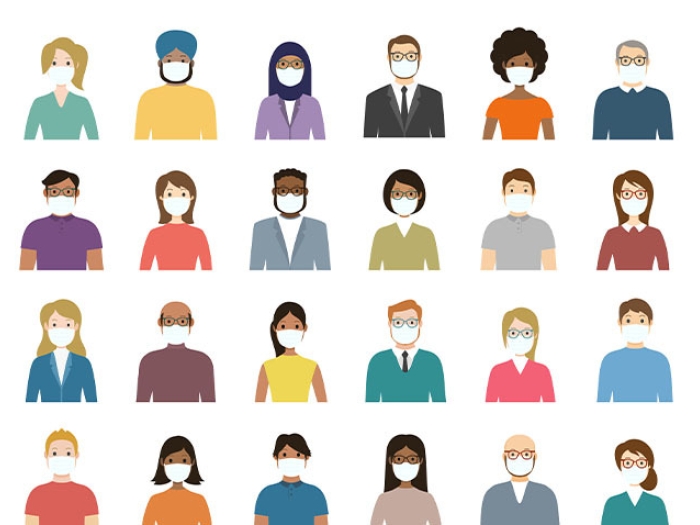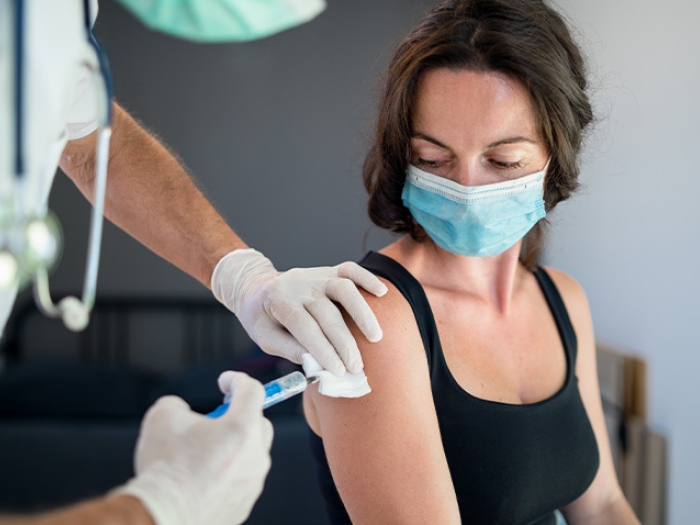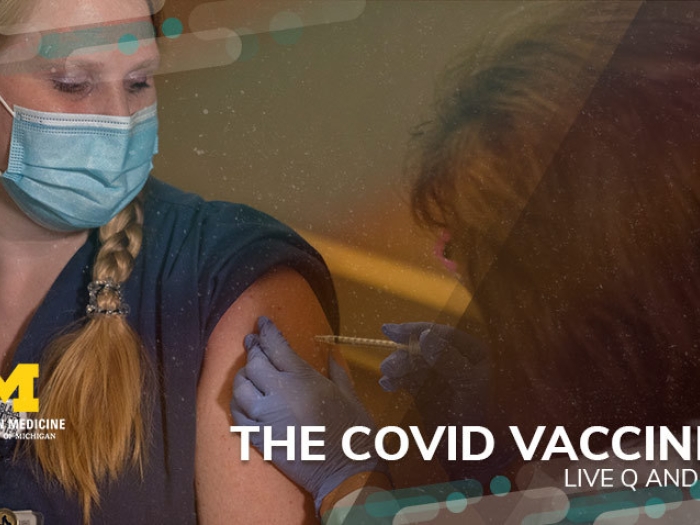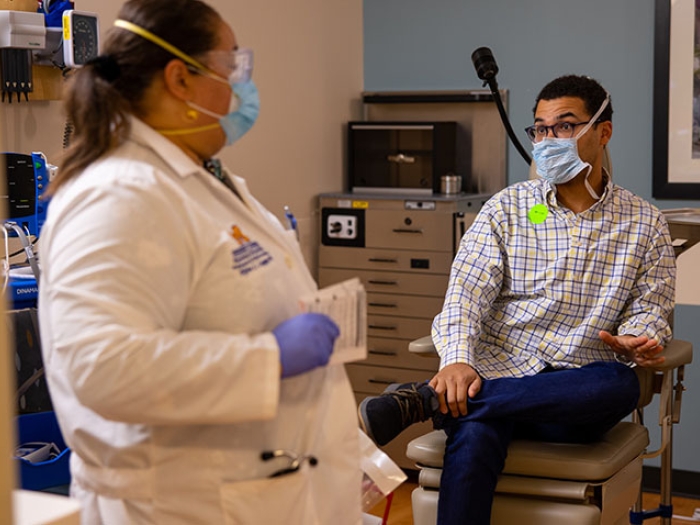The four expert-approved steps to follow before, during and after your gathering
5:00 AM
Author |

It's the holiday season, and while people are making their lists and checking them twice, most are also hoping to avoid an uninvited guest—COVID-19.
You can still gather with loved ones, say U-M experts, you just need a plan.
The best tools for avoiding the coronavirus are now supported by more than a year's worth of real-world evidence. There are simple steps you can follow to greatly reduce your risk of getting infected and getting sick.
4 ways to reduce COVID risk this holiday season
1. Get vaccinated
One of the most powerful tools for avoiding infection and illness is the COVID-19 vaccine.
"Before gathering, just make sure you've given yourself enough time to get the full effect of your vaccine or booster dose, especially if you're planning to go to a larger gathering or even a smaller gathering," said Laraine Washer, M.D., a clinical professor of infectious diseases at the University of Michigan Medical School and hospital epidemiologist at U-M Health. That means two weeks from the second dose of your primary booster for the mRNA vaccine or two weeks after the booster dose.
Why?
According to the Centers for Disease Control and Prevention, the COVID-19 vaccines protect everyone age 5 and older from getting infected and severely ill, and significantly reduce the likelihood of hospitalization and death. Unvaccinated people have higher case rates and higher death rates than those who are vaccinated against COVID-19. Getting a booster dose offers even more protection from infection—and may be especially important as the new omicron variant begins to circulate more widely.
2. Get tested
The vaccines are very effective, but just like all other vaccines, they're not 100% effective at preventing an infection.
If you have symptoms, get tested before gathering and don't attend unless your COVID test is negative. Thankfully, there are effective at-home tests.
"A test is better than no test," said Riccardo Valdez, M.D., director for the Division of Clinical Pathology at U-M Health. "Use an at-home test as directed by the test insert and know that the more frequently you use them if you are feeling sick, the more likely you are to detect the infection."
Valdez especially recommends the home antigen tests for people who are mildly symptomatic – like a runny nose, or if you don't feel quite right but might chalk it up to allergies.
Like Podcasts? Add the Michigan Medicine News Break on iTunes, Google Podcasts or anywhere you listen to podcasts.
The tests are also valuable for asymptomatic people, though they are less sensitive. Be sure to follow the directions closely, as most tests are not one and done, advises Valdez. (For example, the popular BinaxNOW test contains two cards, designed for one person to test twice within three days.)
"Depending on the risk, for a multi-household gathering, you could take a rapid antigen test to provide an extra layer of assurance that no one has unrecognized or early infection," said Washer.
When in doubt, or if you can't find one of the at-home antigen tests, you should seek a molecular test from a laboratory or medical office.
Both Valdez and Washer advise taking the test as close as possible to the time of your gathering or event. If you are traveling, you should also take a test upon returning home.
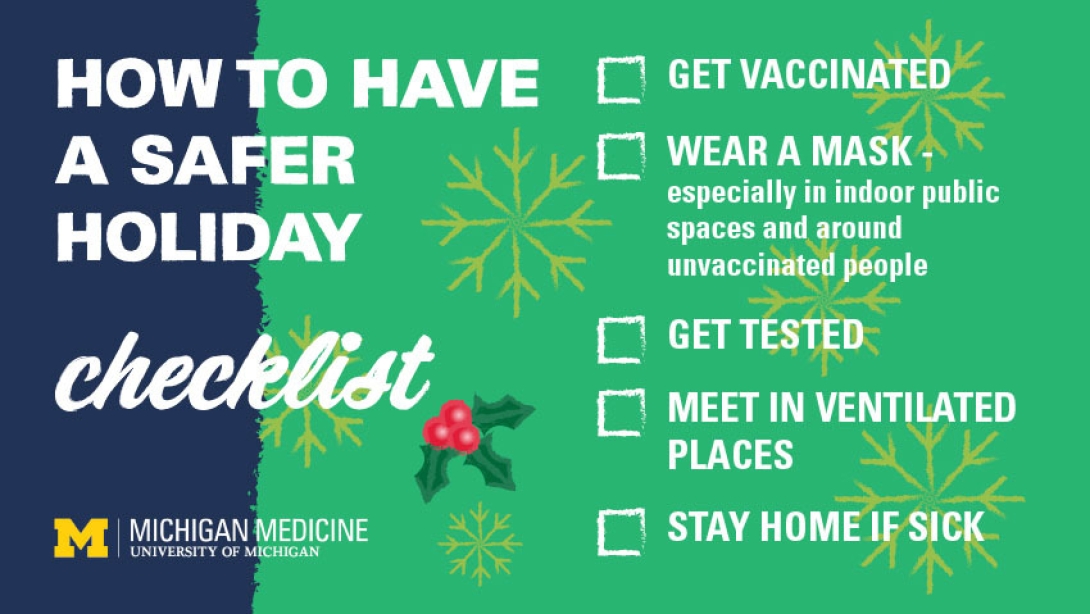
3. Improve ventilation
SARS-CoV-2, the virus that causes COVID-19, spreads through the air.
"What you want to do is avoid being in closed spaces with many people for long durations with poor ventilation. That's the perfect storm," said Jesse Capecelatro, Ph.D., assistant professor in Mechanical Engineering and Aerospace Engineering at the University of Michigan.
When people talk or even breathe, they exhale droplets, which evaporate and then hang in the air, unless a window is open or there is good ventilation. He notes that a cough can emit 10 to 20 thousand particles.
"When it comes to mitigation, you want to avoid inhaling as many infectious particles as possible," said Capecelatro. "The longer you are around someone, the more of their exhaled particles you inhale. The more people at a gathering, the higher the risk that one of them may be infected."
Aside from opening windows or investing in HEPA air purifiers (which when placed with the flow of air or in a room where people are gathering, can reduce the number of particles in the air), controlling ventilation can be difficult.
That's where the next tool comes in.
4. Wear a mask
The chances of you getting COVID depends on the number of particles you breathe in. The more particles, the higher your chances. Masks reduce the number of particles breathed out and breathed in, protecting both the mask-wearer and the people around them.
"Wearing a mask among a totally vaccinated group if they are people that you commonly interact with may not be as important," said Washer. "But if it's a gathering of a large number of people that you don't commonly interact with, you may choose to wear a mask even if everyone is vaccinated, if you're in an indoor space that is not well ventilated." She says that, in general, a well-fitting, multi layered mask is sufficient, especially if everyone in the gathering is wearing one.
MORE FROM MICHIGAN: Sign up for our weekly newsletter
Additionally, it's important to wear a mask in public indoor spaces—such as when out shopping for groceries or last-minute gifts—in areas with substantial or high transmission.
Capecelatro notes that masks help stop the spread of the virus in four ways.
"One, they prevent many exhaled particles from escaping; two, they reduce the number of particles you're inhaling; three, they prevent exhaled particles from evaporating, collecting them inside the mask; and four, they reduce the momentum with which the particles can spread to others around you."
Washer notes that people who are immunocompromised, even if vaccinated, should take extra precautions and wear a mask when around people who are outside of their household, even if those other people are vaccinated.
As for the threat of the omicron variant, said Washer, "at this point we believe that the mitigations we have in place that are protective against delta and prior variants should also be effective against omicron."
With these steps in place, you can significantly reduce your risk of infection from COVID-19 and have an enjoyable, and healthy, holiday.

Explore a variety of healthcare news & stories by visiting the Health Lab home page for more articles.

Department of Communication at Michigan Medicine
Want top health & research news weekly? Sign up for Health Lab’s newsletters today!

